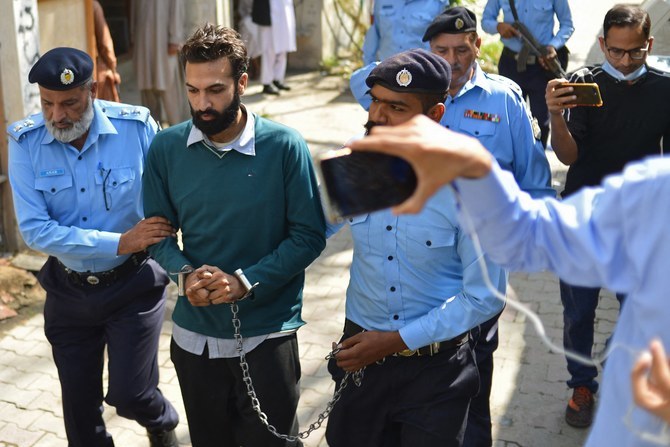ISLAMABAD: An Islamabad court on Thursday ruled that Zahir Jaffer, the prime accused in the Noor Mukadam murder case, was not suffering from a mental disorder and used it as an excuse to “get rid of criminal liability,” the court judgment said.
Mukadam, the 27-year-old daughter of a former Pakistani diplomat, was found beheaded at Jaffer’s residence in Islamabad’s upscale F-7/4 neighborhood last July in a case that sparked public outrage and grabbed media attention unlike any other recent crime against women. Jaffer, the prime suspect, was arrested from the crime scene on the day of the murder.
In December 2021, Jaffer’s lawyer had filed a plea with Additional Sessions Judge Atta Rabbani, seeking the constitution of a medical board to ascertain whether his client was of sound mind or not. The plea was filed after Jaffer was expelled twice from the courtroom for disrupting trial proceedings.
Public prosecutor Hasan Abbas, however, requested the court to reject Jaffer’s insanity plea, arguing the accused had been the chief brand ambassador of a company owned by his family and was therefore mentally fit.
In the four-page judgment, the Islamabad district and sessions judge wrote that the facts showed that Jaffer was not suffering from any mental illness, rather the excuse of mental illness was offered to avoid punishment in the case.
“Facts and attending circumstances reveal that the accused is not suffering from mental illness,” the judgment read.
“Such afterthought plea has been raised just to get rid of criminal liability... Therefore, application in hand is dismissed.”
The judge also pointed out that if the accused had been suffering from a mental illness, then the plea to constitute a medical board should have been filed by Jaffer’s parents or close friends.
The judgment stated that on December 1, 2021, state counsel Sikander Zulqarnain Saleem argued before the court for the first time that Jaffer was mentally ill. The judge suspected foul play in raising the issue of the accused’s mental health, considering the trial was about to end.
“No such objection has ever been raised before the learned magistrates at remand stage as well as before this court,” the court observed.
“Now the trial is going to end very soon and then the objection regarding mental state of the main accused has been raised.”
The court also noted that the insanity plea had been moved without providing any previous medical history of the accused.
“The court also tentatively examined the accused Zahir Zakir Jafar on 08.12.2021, but nothing such disability has been observed,” the judgment read.












